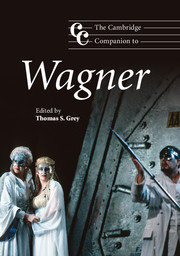Book contents
- Frontmatter
- PART I Biographical and historical contexts
- 1 Wagner lives: issues in autobiography
- 2 Meister Richard's apprenticeship: the early operas (1833–1840)
- 3 To the Dresden barricades: the genesis of Wagner's political ideas
- PART II Opera, music, drama
- PART III Ideas and ideology in the Gesamtkunstwerk
- PART IV After Wagner: influence and interpretation
- Notes
- Select bibliography
- Index
1 - Wagner lives: issues in autobiography
from PART I - Biographical and historical contexts
Published online by Cambridge University Press: 28 September 2011
- Frontmatter
- PART I Biographical and historical contexts
- 1 Wagner lives: issues in autobiography
- 2 Meister Richard's apprenticeship: the early operas (1833–1840)
- 3 To the Dresden barricades: the genesis of Wagner's political ideas
- PART II Opera, music, drama
- PART III Ideas and ideology in the Gesamtkunstwerk
- PART IV After Wagner: influence and interpretation
- Notes
- Select bibliography
- Index
Summary
Wagner's biography has been researched to within an inch of its life. It has been dissected, drenched with no end of detail, eroticized, vilified, heroicized, and several times filmed. Its foundations are the collected writings, which in the first instance Wagner edited himself in the spirit of an autobiographical enterprise, a separate and lengthy autobiography Mein Leben (My Life) dictated to his mistress and later second wife Cosima, notebooks and diaries, photographs and portraits, an unusually large number of letters, mounds of anecdotal gossip, and no end of documentation on the way he lived and how his contemporaries saw him. In this sense, he is almost the exact antithesis of Shakespeare, whose life, or at least what is safely known about it in terms of verifiable “facts,” can be told in a relatively short space. I have summarized the history of Wagner biography elsewhere. Here I want to look at Wagner's own portrayals of his life, some issues they raise, the philosophical spirit in which I believe they were attempted, and their effect on the generation that came immediately after him.
Biographers of Shakespeare have had to resort to imaginative reconstructions and not infrequently to forged documents that have accorded their subject more lives than a cat. In stark contrast, there appears to be only one life for Wagner, which he did his best to determine in large part himself. It was also a singular life in another sense: maverick, turbulent, exceptionally creative on many levels, never afraid to attempt the impossible, uncannily prescient of modern thinking about media and human psychology, genuinely revolutionary in aspiration, and yet prone to an institutionalism with proto-fascist traits that were largely, but not only, the result of posthumous aggrandizement on the part of his apostles and admirers. In all its colorful detail, the story has been repeated so many times – with its hero’s adventures, amours, tribulations, and eventual acceptance among Western music’s cultural elite all in their proper place – that at first sight it seems like a never-changing biographical myth.
- Type
- Chapter
- Information
- The Cambridge Companion to Wagner , pp. 1 - 17Publisher: Cambridge University PressPrint publication year: 2008

